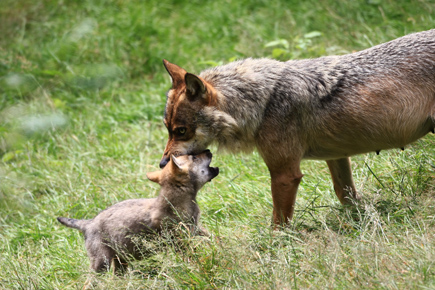++ Results of wolf monitoring show at least 95 settled packs ++ Sudetes are also wolf territory again ++

Wolves are very social animals that rear their young with great dedication.
© Jörg PukownikHamburg, Radolfzell. The number of wolf packs in Western Poland, close to the German border, has further increased compared to the previous year. That is the finding of the wolf monitoring exercise financed by the IFAW (International Fund for Animal Welfare) and nature conservation foundation EuroNatur. Monitoring is carried out by a Polish nature conservation organisation, Association for Nature Wolf (AfN Wolf), which has now presented its latest report.
On the basis of their research, the Polish scientists estimated that, at the end of the monitoring year 2018/19, the wolf population west of the Vistula River included at least 95 resident packs; more than at any time since data collection began in 2003.
For the first time, the scientists were also able to verify the existence of at least three reproducing packs in the Sudetes Mountains, in the Czech-Polish border region. This is particularly pleasing because no wolves have reproduced there for around 200 years.
“In 2019/2020 too, we expect to see a further increase in wolf numbers in Western Poland”, said Andreas Dinkelmeyer from IFAW Germany. “All suitable habitat will probably then be occupied. The growing number of wolves seems to generate less tension in Poland than it does in Germany. We would like to be able to have a similarly calm and solution-focused debate about wolves here too.”
“The growth of the wolf population in Poland means that the wolf is also advancing into areas here, where previously it was either completely absent or present only in very small numbers - for example, in the Sudetes Mountains. In these areas, both in Poland and in Germany, a great deal of educational work is needed to support livestock keepers with well-considered, tried and tested measures to safeguard their animals”, said Magdalena Kulisch, project leader at EuroNatur.
Through their financial support, EuroNatur and IFAW are ensuring that AfN Wolf is able to scientifically monitor the development of the wolf population in Western Poland.
Background information:
- You can find out more about how EuroNatur is working to protect wolves here: www.euronatur.org/en/what-we-do/endangered-species/wolf/wolves-in-europe/
-
About IFAW: IFAW (International Fund for Animal Welfare) is a worldwide not-for-profit organisation helping animals and people thrive together. We work across seas and oceans and in more than 40 countries around the world. We rescue, rehabilitate, and release animals, and we restore and protect their natural habitats. The problems we are up against are urgent and complicated. To solve them, we match fresh thinking with bold action. We partner with local communities, governments, non-governmental organisations, and businesses. Together, we pioneer new and innovative ways to help all species flourish. You can find us here: www.ifaw.org
Contact:
EuroNatur: Anja Arning, anja.arning(at)euronatur.org, Tel.: +49 (0)7732 - 92 72 13
IFAW: Andreas Dinkelmeyer, adinkelmeyer(at)ifaw.org, Tel.: +49 (0) 173 622 75 39


